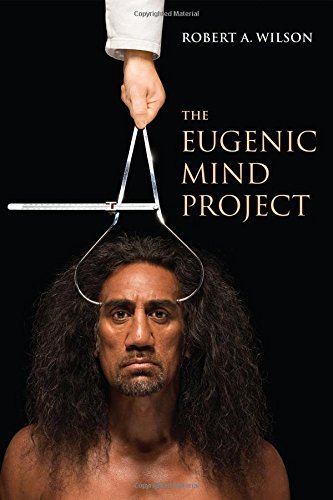All books / Book
The Eugenic Mind Project (The MIT Press)

| Full title: | The Eugenic Mind Project (The MIT Press) |
|---|---|
| ISBN: | 9780262037204 |
| ISBN 10: | 0262037203 |
| Authors: | Wilson, Robert A. |
| Publisher: | The MIT Press |
| Num. pages: | 352 |
| Binding: | Hardcover |
| Language: | en |
| Published on: | 2017 |
Read the reviews and/or buy it on Amazon.com
Synopsis
Part Science And Part Social Movement, Eugenics Emerged In The Late Nineteenth Century As A Tool For Human Improvement. In Response To Perceived Threats Of Criminality, Moral Degeneration, Feeble-mindedness, And The Rising Tide Of Color, Eugenic Laws And Social Policies Aimed To Better The Human Race By Regulating Reproductive Choice Through Science And Technology. In This Book, Rob Wilson Examines Eugenic Thought And Practice - From Forced Sterilization To Prenatal Screening - Drawing On His Experience Working With Eugenics Survivors. Using The Social Sciences' Standpoint Theory As A Framework To Understand The Intersection Of Eugenics, Disability, Social Inclusiveness, And Human Variation, Wilson Focuses On Those Who Have Lived Through A Eugenic Past And Those Confronted By The Legacy Of Eugenic Thinking Today. By Doing So, He Brings Eugenics From The Distant Past To The Ongoing Present. Wilson Discusses Such Topics As The Conceptualization Of Eugenic Traits; The Formulation Of Laws Regulating Immigration And Marriage And Requiring Sexual Sterilization; The Depiction Of The Targets Of Eugenics As Subhuman; The Systematic Construction Of A Concept Of Normality; The Eugenic Logic In Prenatal Screening And Contemporary Bioethics; And The Incorporation Of Eugenics And Disability Into Standpoint Theory. -- From Dust Jacket. Machine Generated Contents Note: I. Eugenic Activities: Probing Eugenics -- 1. Standpointing Eugenics -- 2. Characterizing Eugenics -- 2.1. The Short History Of Eugenics -- 2.2. A Galtonian Start -- 2.3. Eugenics As Applied Science -- 2.4. Between Science And Social Movement -- 2.5. Eugenics, Race, And Ethnocentrism -- 2.6. Galton, Mental Abilities, And The Weak-minded -- 2.7. Eugenics And The Mentally Deficient -- 2.8. The Long Past Of Eugenics -- 3. Specifying Eugenic Traits -- 3.1. What Is A Eugenic Trait? -- 3.2. Research Publications -- 3.3. Popular Culture -- 3.4. Eugenic Laws: Marriage And Immigration -- 3.5. Sexual Sterilization Legislation -- 3.6. Alberta At The Legislative Margins -- 3.7. Institutionalization And The Social Mechanics Of Eugenics -- 3.8. Mental Defectives And The Mentally Ill: Beyond Consent -- 3.9. Three Eugenic Traits: Syphilis, Huntington's, And Epilepsy -- 4. Subhumanizing The Targets Of Eugenics -- 4.1. What Sorts Of People Should There Be? -- 4.2. The Pursuit Of Human Perfection And Life-worthiness -- 4.3. Eliminating Defectives In Medicine's Short History -- 4.4. Tough Medicine In Postwar Alberta -- 4.5. Rational Ethics: Cognitive Disability In The Eugenic Now -- 4.6. Subhumanization And Standpoint's Complexities: Ashley X -- 4.7. Life-worthiness And Human Variation -- Ii. Eugenic Variations: The Persistence Of Eugenics -- 5. Where Do Ideas Of Human Variation Come From? -- 5.1. Standpoint, Prosociality, And Human Variation -- 5.2. The Puzzle Of Marked Variation -- 5.3. Four Initial Desiderata -- 5.4. Variation, Subnormalcy, And Categories Of Disablement -- 5.5. Biopolitics And The History Of Eugenics -- 5.6. Evaluating The Appeal To Biopolitics -- 5.7. Constructivism's Open Question And Further Desiderata -- 5.8. Conclusion -- 6. A Socio-cognitive Framework For Marked Variation -- 6.1. A Hobbesian Prelude: Born To Be Not-so-wild -- 6.2. Sociality And Prosociality -- 6.3. Human Sociality And Its Cognitive Demands -- 6.4. Shared Intentionality And Collective Social Action -- 6.5. Sketching The Socio-cognitive Framework -- 6.6. Sorts Of People, Normativity, And Marked Variation -- 6.7. Clarifying What First-person Plural Mechanisms Are -- 6.8. Return Of The Seven -- 6.9. Standpoint Eugenics In The Socio-cognitive Framework -- 7. Back Doors, Newgenics, And Eugenics Underground -- 7.1. Newgenics -- 7.2. The Prenatal Back Door To Eugenics -- 7.3. Eugenic Subhumanization And A Continuing Preoccupation -- 7.4. Recasting Debate Over The Expressivist Objection -- 7.5. Outing Eugenic Logic In Bioethics: Agar And Savulescu -- 7.6. Diversity And Neoliberalism -- 7.7. Eugenics As Private Enterprise -- 7.8. Eugenic Techniques Of Silencing -- 7.9. Conserving Disability -- 8. Eugenics As Wrongful Accusation -- 8.1. Persistent Eugenic Pasts -- 8.2. Subhumanizing Tendencies And Procedural Indifference -- 8.3. An Appeal To Wrongfulness -- 8.4. The Case Of Ritual Sexual Abuse -- 8.5. Beyond Moral Panic, Groupthink, And Evil's Banality -- 8.6. Herman On Witnessing And Complicity -- 8.7. From Innocent Bystander To Ally And Advocate -- 8.8. The Psycho-social Dynamics Of Wrongful Accusation -- 8.9. Persistence Redux -- Iii. Eugenic Voices: Knowing Agency At The Margins -- 9. Knowing Agency -- 9.1. Marginal Knowing -- 9.2. Who Cares About Who Knows? -- 9.3. Cognitive Disability And Its Challenges -- 9.4. Vignettes And Voices -- 9.5. Epistemology Impoverished And Knowing Agency -- 9.6. The Politics Of Epistemic Apartheid -- 10. Eugenics Unbound: Survivorship For The Subhuman -- 10.1. Standpoint Theory And Knowing Agency -- 10.2. Standpoint Agents For Class And Gender -- 10.3. Race, Lived Reality, And Group-based Agency -- 10.4. Generalizing Standpoint Theory -- 10.5. Joint And Extended Action In Intellectual Disability -- 10.6. Intrinsic Heterogeneity And Sorts Of People -- 10.7. Recovering The Voices Of Eugenic Survivorship -- 10.8. Narratives, Stories, And Standpoint -- 10.9. Concluding Thoughts. Robert A. Wilson. Includes Bibliographical References And Index.